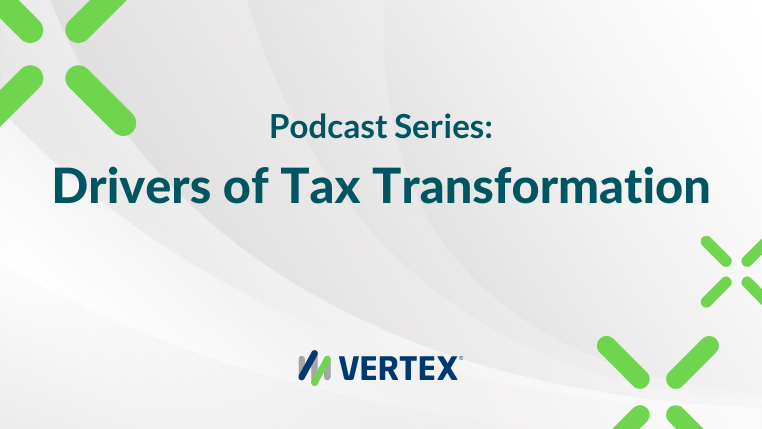Steve Johnston: Welcome to Tax Matters, a Vertex podcast! I’m Steve Johnston, Product Marketing Manager at Vertex.
Tax transformation is a table-stakes requirement to remain compliant and competitive. As tax regulations and business models evolve, so, too, should the automation solutions and processes tax and finance teams leverage.
In this episode of our series on tax transformation, IDC Research Director for Financial Applications, Kevin Permenter, discusses the factors driving the need for tax process and technology changes.
Kevin starts with a look at the business changes and challenges having substantial impacts on tax groups. He also examines the beneficial role that APIs and other technological advancements play in driving tax transformation forward. Kevin concludes the discussion with a look at e-invoicing trends.
Now, I’ll turn it over to our moderator, Eric Krell, and Kevin Permenter…
Eric: Thanks for joining me today, Kevin. Let’s start our discussion with tax transformation. What does the term mean, broadly speaking, and then please identify some of the drivers behind the need for tax transformation.
Kevin: Yeah, the term has been taking on new and deeper meaning as the role of compliance has become more core to the office the CFO. Now, more than ever, compliance is playing a central role in the office of the CFO and understanding the entire footprint – the true, financial footprint -- of the organization. As a result, you’ve seen a lot of tailwinds pushing digital tax transformation forward. Some of those tailwinds are actually business interests and business reasons. A lot of organizations that are doing business globally really appreciate the visibility and the transparency that comes with the adoption of advanced compliance technology. They really appreciate the flexibility that comes along with it, so that they can sell more stuff to more places faster than ever before, which is what the market is demanding of them.
One of the bigger tailwinds that is pushing this market forward toward transformation is this idea of regulation. Regulations that are emanating from various parts of the EU, South America, Asia, and the South Pacific are all pushing one main narrative forward, which is that the tax administrations these businesses operate under will be more involved. Enforcement will be a priority going forward. So, you’ll see that regulation and the regulatory environment [represent] a main driving force behind tax transformation.
Eric: And tax transformation obviously doesn’t happen in a vacuum. What are some of the most notable challenges businesses, and also their tax groups, are confronting right now?
Kevin: Yes. Some of the things that we’re seeing out there are the rapid changes that happened post-COVID in the B2B commerce and B2C e-commerce landscape. It really jumped out to the forefront; most businesses now will partake, and it won’t be a mixed thing for certain online retailers. Customers themselves have become accustomed to a new level of omnichannel presence, which is demanding a smoother interplay between finance and manufacturing and inventory and supply chain and, of course tax compliance for all of that movement.
Eric: I want to ask you to go into this area a little bit more -- I’m thinking of the shifting customer expectations. How are companies evolving and changing to meet these new expectations, from a sales perspective and from a technology perspective?
Kevin: What’s really interesting is that now customers are expecting to have accurate tax calculations at the point of sale, right? Right there, immediately. They don’t want to wait even a fraction of a second. Compliance success can be measured in fractions of a second. What’s really interesting is that the compliance role, especially when you’re talking at that point of sale, whether it’s an online point of sale or a brick-and-mortar point of sale, the compliance piece actually becomes part of the customer experience. It becomes a key aspect of customer satisfaction.
Eric: You also mentioned regulations as one of the drivers of tax transformation. What current tax compliance requirements (and also any looming regulatory changes) are posing major challenges or might do so in the near future?
Kevin: Absolutely. Most businesses as they sort of grow up, are now running into these regulations and maybe even multiple versions of these regulations as they move through their maturity curve. It used to be that if you were a small company and you sold locally, all you really needed to know was your particular jurisdiction, and how they handle tax in that particular place. That’s kind of how it was. But at this point in business dynamics, you can be a fairly small online seller of T-shirts or some other customized good, and you can have international customers and be exposed to a ton of international, as well as local, rules and regulations. Some that are core in the U.S. are sales and use tax. That is something you’re dealing with in the U.S. -- all of the 15,000, 16,000 or 17,000 jurisdictions and how they handle sales transactions of particular types. In the EU and some other countries abroad, you have more of a consumption-based approach to tax, which is VAT. Ad that carries its own complexities. The real issue that you run into, is that that complexity isn’t uniform. It’s different from one country to the next country to another country, and even that level of complexity becomes more difficult in that some of these countries change how they handle things from year to year. One of the things that we see coming down the pipe as a real game changer is the continued adoption and proliferation of invoicing mandates. Many of the larger companies are already on the e-invoicing train, but for many smaller companies, this will be new to them. That will be a major driver for tax transformation as we move into the next three, four or five years.
Eric: Kevin, I know that the EU just came out with its VAT in the Digital Age proposal that will take some time to be finalized. I also know that leading tax groups aren’t waiting. What challenges do e-invoicing regulations impose on tax groups?
Kevin: Well the challenges are essentially that you’re adding a step to the transaction process. So, in some cases, the invoice has to go to a clearinghouse format, has to go to the tax entity, the tax authority, and then from there, if it meets all the proper standards and those sorts of things, then it goes on to its final destination with the other party. So, a vendor sends it to the tax authority, then a tax authority ultimately sends that to the supplier. That’s an example of a lot more complexity being introduced into the selling process…. But I have to tell you, what’s really great is that there are enough benefits even beyond just saying, "Hey, we’re compliant. We’re not going to get fined; we’re not going to get punished, or face penalties." Even beyond that, there are enough incentives that businesses are saying, "Hey, we like the fact that e-invoicing forces us to digitize our transactions such that we now have visibility into that transaction, and we can include the details of that transaction in our budgeting and planning systems or in our forecasting operations."
Eric: Well, Kevin, a lot to think about with tax transformation. Thanks very much, I appreciate it.
Kevin: You’re welcome.
Steve Johnston: Thanks for listening to Tax Matters and our series on tax transformation.
This transcript has been edited for clarity.


